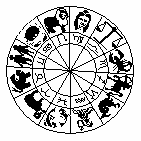
Astrology is defined in the Merriam-Webster dictionary as "divination based on the supposed influence of the stars upon human events." Even this "definition" reflects the deep-seated prejudice against astrology and those who practice.
More accurately, astrology is the study of the rhythms and paths of the planets and stars as seen from the earth and how they reflect the rhythms and pathways of both individual and collective human events. "As above, so below" is the operating principle in the study of astrology, and its language is steeped in symbolism and archetypal images. To reduce the art of astrology to mere "divination" is to do a great disservice to this practice which can aid us to better understand ourselves, others and the rhythms of the world in which we live.
Astrology has been practiced since the beginning of civilization in cultures across the world. When we usually speak of astrology, we think of western astrology with its 12 signs, but astrology is practiced in many different ways by many different peoples.
Chinese astrology is a complex blend of astronomy, geography, mathematics and centuries of observation, which places 154 stars into 12 "palaces" in the sky. (Western astrology uses 12 "houses" in much the same way.)
Archaeological evidence indicates that the ancient Chaldeans, Arabs and Egyptians utilized astrological practices. In fact, "chaldean" came to be synonymous with "astrologer," their astrology was so well-developed.
The Hindus practiced Vedic astrology, and it figured prominently in ancient Greece and Rome.
Astrology was highly developed and astrologers were respected and spent many years in training. In ancient China, it took 20 years or more of study before one could properly be called "astrologer."
Astrology was always closely linked with the art/science of medicine - the placement of the stars indicated body types and tendencies, ruled over various herbs and medicines, and was used to determine the proper time and day for medical procedures. Until the late Middle Ages, no physician worth his salt would have dreamed of practicing medicine without a solid foundation in astrology.
Astrology began to fall into disfavor after the fall of the Roman Empire, when the Church began to rule the known western world, although the practice continued, even among churchmen. The Arab world, however, continued to use and develop astrology.
St. Thomas Aquinas, in the 13th century, helped to influence the resurgence of astrology in Europe, and by the Renaissance, even Popes had staff astrologers. One of the most famous Renaissance astrologers is Michel de Nostrodamus.
Astrology is still practiced the world over. Visit my
astrology links page to
learn more about astrology.